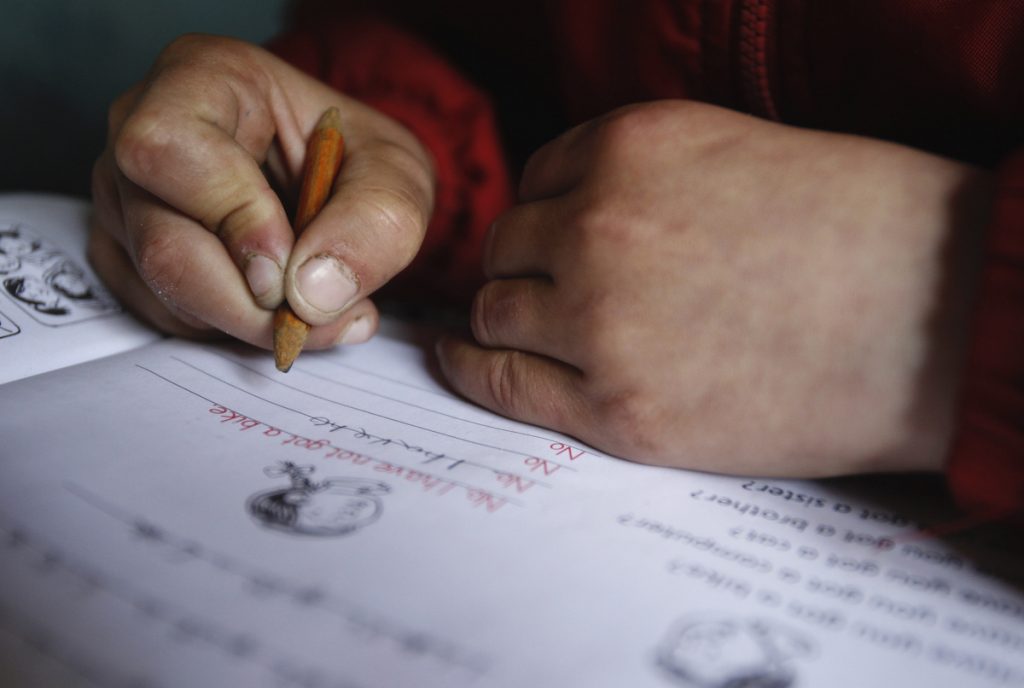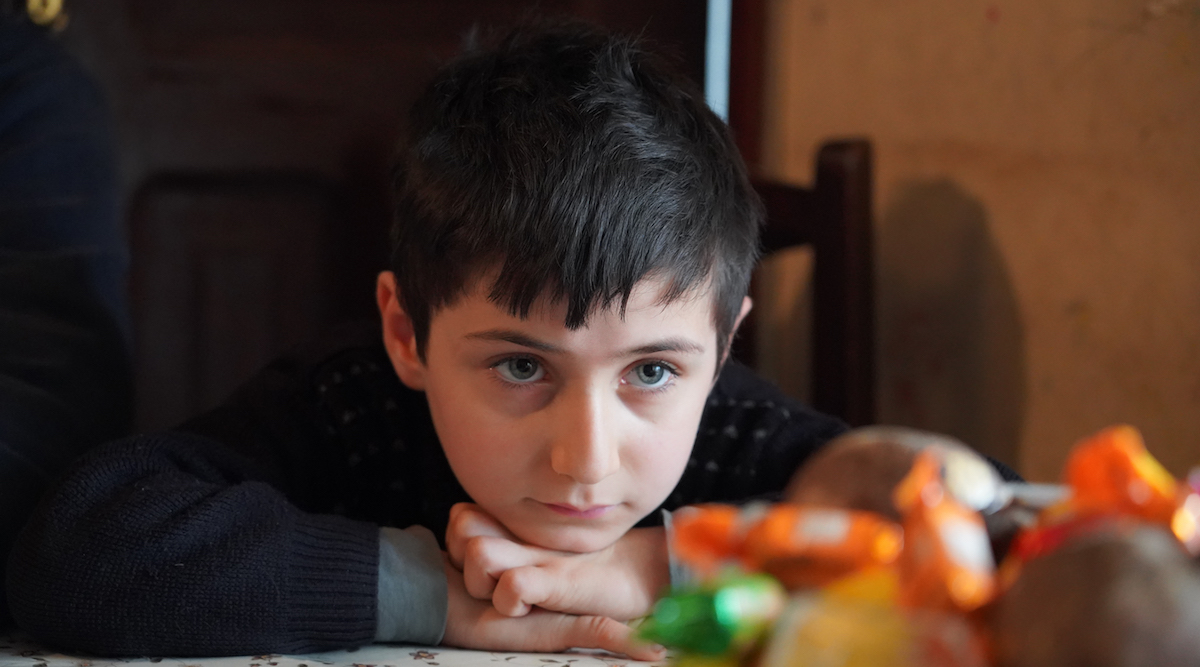Are children in Georgia hungry and do they need free meals at school?
Two weeks before the second round of local elections, opposition Tbilisi mayor candidate Nika Melia came up with an initiative to introduce free meals for public school students. Melia stated that if he wins, it will be one of his first promises to be fulfilled.
The promise of a mayoral candidate from the main opposition United National Movement party, supported by other parties, has caused much controversy. Melia’s opponents accused him of populism, claiming that free food is a “reminder of communism”.

Little is known about Nika Melia’s school meals project.
According to the UNM party, the specific plan will be announced after Melia is elected mayor of Tbilisi.
The ruling party called the pledge “a desperate step” taken “because Melia is losing the Tbilisi elections”.
More than 100 million lari [about $ 31 million] will be required to implement this plan, said Irakli Kobakhidze, chairman of the Georgian Dream.
“Where will he get these sums from? Will he take it away from health care or from other spheres?”, Kobakhidze asks.
There are 289 schools in Tbilisi with 180,000 students.
Niki Melia’s program is designed for 180 study days a year, said UNM member Levan Khabeishvili. Approximately 2.5 GEL [less than $ 1] will be allocated per child per day, and in general from the capital budget for the free school meals program – 50-70 million lari [about $ 16-23 million].
In addition to the authorities, the opposition liberal party Girchi opposed the election promise of the UNM mayoral candidate
Children in Georgia “do not starve,” said MP Alexander Rakviashvili, one of the party’s leaders.
Are children hungry in Georgia?
Recently, a number of studies have been published in Georgia showing the difficult social situation in the country, primarily for children.
According to a program document prepared in 2021, which considers the need to create a free school meals system in Georgia, there are a total of 592,900 students in the country, of which 545,270 (89.4%) attend public schools.
62,480 children (11% have a socially unprotected status.
One fifth (22%) of socially unprotected children live in Tbilisi.
77% of the students surveyed said they sometimes (42%) or always (35%) feel hungry when they go to school.
According to the Public Defender’s 2019 report, almost one in four children in Georgia (24.4%) live in poverty.
After discussing the introduction of free meals in schools, many teachers wrote on Facebook that the problem of child hunger is relevant in schools:
“Once I was having lunch at school with mchadi (corn tortilla) with cheese. Suddenly I see a girl who cannot go to the buffet. I invited her, shared the food with her, and soon saw her leave the classroom, go to her first grader brother and share the food with him. The next day her brother also came to our class”, recalls Lana Berdzenishvili, a former teacher.
“Free meals for children at school is a good promise, and those of us who work with children know this well”, Anna Arganashvili, executive director of the Partnership for Human Rights NGO, told JAMnews.
Moreover, Arganashvili says that poverty and poor nutrition are often the reasons for the separation of a child from his biological family:
“One of the main reasons why a child is often taken from biological parents and given to a foster family is poverty. And the fact that a child in a family cannot receive a balanced diet, which is necessary for their development. This is a violation of children’s rights – poverty should not be the reason for depriving a child of his parents, and if parents cannot properly feed their children, the state should help them”, says Arganashvili.
The Public Defender confirms this. For example, in the report of the Public Defender for 2019, we read that last year more than 80 children were taken from their families due to poverty and transferred to the state guardianship program.
Most children living in Georgia are deficient in essential micronutrients such as iron, zinc and calcium due to malnutrition, says Professor Rusudan Kvanchakhadze, Vice President of the Georgian Association of Nutritionists:
“When the body cannot get healthy and balanced food, it negatively affects physical, mental and intellectual development. Children who do not get enough food and the right amount of micronutrients have impaired concentration and learning difficulties”.
“Even mild to moderate malnutrition negatively affects a child’s academic performance and cognitive function, psychomotor development and motor skills. These children are not very active and do not acquire the physical or intellectual skills necessary for working in adulthood. It also affects the economic development of the country, ”says Kvanchakhadze.
Experience from other countries
To take care of the health and performance of children, many countries have introduced nutritional programs in public schools.
For example, the free school lunch program has been operating in Finnish schools since 1948. The students are eating in the cafeteria. Their menu is sure to include hot food, vegetables, meat or fish and bread.
School meals in Estonia are also free and fully funded by the state.
In the United States, each state has its own policy. There is a mixed model here. If the child is from a wealthy family with a high income, his / her meals are funded by the family, and the child from a low-income family is fed free of charge through the government program.
◤ In 2021, the Global Fund for Baby Food conducted a survey of the state of school feeding in 103 countries. A massive school feeding program was in place in 85 of the 103 countries surveyed. Georgia is among the rest 18. ◢
Anna Arganashvili was in the United States last year on a training program. Her son also studied at one of the public schools in Texas, and Anna financed his meals at the school through her own scholarship.
“The food was inexpensive and suited the needs of the child. The menu of the week is compiled in advance, and the child chooses what they want from this menu. The menu must include a salad of fresh vegetables, meat or fish, as well as desserts such as yogurt. I paid three to five dollars a day for his food”, Arganashvili recalls.
Nutrition for children is so important in the United States, she said, that during the pandemic, when schools were closed, children who had free meals in schools were delivered home.
Most importantly, where there is a mixed model and budget food for children from low-income or vulnerable families, everything is arranged so that children for whom the state pays for food do not feel humiliated.
In the school cafeteria, money is not paid. All students have plastic cards with which they pay for food in the school cafeteria.
“If the child does not say this, no one knows who is transferring money to the card – the state or the family. This is a good mechanism to protect a child from bullying”, says Anna Araganashvili.



















